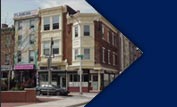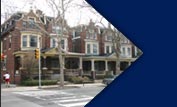- Home
- About
- News
- Tax Reform
- Ethics Reform
- Budget Reform
- Reformer’s Roundtable
- Contact Us







Inquirer Lays Out City Real Estate Tax Mess In Black And White
 Philadelphia Forward's lawsuit to compel the city to accurately value properties for tax purposes is drafted and it has been shared with city officials for their review. If the city does not take steps to remedy this problem, we will file the lawsuit in the coming days and ask a judge to order the city to fix the system.
Philadelphia Forward's lawsuit to compel the city to accurately value properties for tax purposes is drafted and it has been shared with city officials for their review. If the city does not take steps to remedy this problem, we will file the lawsuit in the coming days and ask a judge to order the city to fix the system.
Why do we need to sue to compel the city to fix this system? The Philadelphia Inquirer lays out the problems involved with real estate taxation in Philadelphia in black and white in a superbly crafted indictment of the current system. Click here to read the entire 3,000+ word, impeccably researched masterpiece - highlights are excerpted below.
Of the 400,000 homeowners in Philadelphia, only 3 percent receive property-tax bills based on the true value of their real estate. For the remaining 387,000, the amounts they are charged are wrong, and often wildly so - derived from assessments that, on average, are 39 percent off the mark, according to an analysis by The Inquirer. The appraisals border on the randomness of Ping-Pong balls popped from a lottery machine, with winners and losers.
The Inquirer's independent analysis is verification of everything that Philadelphia Forward has been educating about and that Philadelphians have known for years. The valuation of properties for tax purposes in Philadelphia has no relation to true market value. In fact, many property owners are paying too much while many others are not paying their fair share.
The neighborhoods where assessments are too high, and residents pay too much, include some of the poorest in the city. The most egregiously overassessed houses typically have market values under $69,000; their owners are overbilled $116, on average. The inflated appraisals, however, are not limited to distressed blocks. Nearly the entire Northeast, Mount Airy and Olney are overassessed. Neighborhoods in the southern half of the city - with the notable exception of Southwest Philadelphia - are generally underassessed and homeowners undercharged. On the price scale, the properties with the most flagrantly lowball assessments tend to be above $200,000; those taxpayers get an average break of about $500 a year.
The Inquirer's independent experts confirm the problems.
"They are so out of whack, it's unbelievable," said Robert P. Strauss, a property-tax expert and professor of economics and public policy at Carnegie Mellon University in Pittsburgh.
At The Inquirer's request, Strauss and Kevin Gillen, a real estate expert at the Wharton School of the University of Pennsylvania, conducted separate analyses of Philadelphia appraisals. The results of both studies were similar to The Inquirer's. In recent years, as properties have appreciated, "assessment accuracy has worsened dramatically," Gillen concluded.
While officials with the city's assessing bureaucracy claim the system is not broken, their defenses confound the experts.
Strauss, of Carnegie Mellon, reached a similar conclusion. How the BRT could contend that "assessed values in Philadelphia were close to 32 percent of market value is a mystery to me," he said. "It probably reflects some special kind of magic that only those officials in Philadelphia and Harrisburg possess. They probably also believe that the Eagles won the Super Bowl."
The wide spread between assessments and market values found in the Inquirer, Wharton and Carnegie Mellon analyses is largely the result of radical real estate appreciation from 2000 to 2006. As home prices rose, the assessments represented a smaller and smaller portion of the properties' worth.
In the most dramatic cases, such as in booming parts of South Philadelphia and Northern Liberties, assessments are as little as 6 percent of market value. Conversely, in low-end neighborhoods where prices were stagnant or fell, hundreds of homes are assessed at 32 percent or more of market value.
Such haphazardness has deprived homeowners of any understanding of their tax bills, any way of determining whether their bills are fair, and any standard by which to appeal them to the tax board. It also flouts the state constitution's demand for "uniformity." For the constitution's purposes, what matters is that all properties are assessed at the same percentage of market value, be it 10 or 32 or 100.
So if we all know what is wrong with the system, and we all understand that assessments in Philadelphia are so bad that they are illegal, why can't it be fixed? The Inquirer concludes its tome with an analysis of what change would mean and why it is so difficult.
There is an oft-voiced solution to the chaos and inequity that dog Philadelphia's property-tax system: Blow the whole thing up and start over. Even the BRT has wanted to do it - for more than six years. In 2002, the board announced a two-step master plan to upgrade the agency's computer power and make the property-tax system easier to understand. The overhaul was supposed to take place by 2007. Clearly, it didn't.
The BRT already has spent more than $4 million on new computers and the development of statistical models that accurately analyze market trends. It's a work in progress, as assessors still are learning how to use the new equipment, Mescolotto said.
The second step is far more politically perilous: the conversion of assessments to actual market values, ending the bewilderment of the fractional system. The "full value" project would make the system fairer. Property owners could figure out more easily whether their assessments were close to reality. Each would pay the correct amount - neither subsidizing neighbors nor being subsidized.
Under full value, all assessments would be revised to 100 percent of market value. In other words, a house worth $100,000 would be assessed at $100,000, not $32,000 or $12,000. Residential assessments would, on average, be about eight times higher than they are now. In turn, millage would have to be reduced to one-eighth of what it is.
While the city would collect the same amount of money overall, individual taxpayers would notice a difference in their bills - for many, a big one. According to an Inquirer analysis, 39 percent of property owners would see their taxes increase $100 or more, and 37 percent would get decreases of at least $100. The average increase would be $910, the average decrease $985.
The steepest hikes would hit parts of Center City and South Philadelphia. Neighborhoods enjoying the greatest relief would include Southwest and Northeast Philadelphia. For now, though, the project is rocking between the waves. The BRT argues that before it can implement the changes, City Council must adjust the millage rate - something it has not done in 20 years.
Philadelphia Forward understands the problems that would be created by fixing the system and has offered a policy prescription to ensure that Philadelphians are never forced to sell their homes to pay their Real Estate Tax bills:
- Decrease tax-rates to ensure that the reassessments are revenue-neutral for the city and create a reasonable basis for the changes.
- Use a Real Estate Tax relief program to "buffer" changes in assessed values and eliminate the most dramatic one-year changes in tax burden.
- Implement Land-Value Taxation to reduce tax burdens for most homeowners as it encourages development and discourages speculation.
- Create Real Estate Tax deferments so vulnerable homeowners can live in their homes today and pay their tax burden in the future when they sell their homes.
- Establish a Taxpayers' Advocate to educate about Real Estate Taxation and help residents appeal unreasonable assessments.
- Allow taxpayers to pay Real Estate Tax bills in quarterly payments so homeowners can spread payments throughout the year. (As a bonus, this measure would save the city and the school district millions in avoided borrowing costs.)
- Advocate for increased property tax relief from the Commonwealth of Pennsylvania: a state circuit-breaker property tax relief program could hold down Real Estate Tax increases for those on fixed incomes; state-funded low-income property tax relief programs could be expanded for truly needy taxpayers.
But even with these measures and others on the table for public scrutiny and debate, our leaders have balked at making change. This is why the lawsuit is necessary. The system is broken and every day that our politicians dither and avoid making positive change is a day when too many Philadelphians are victimized by unfair tax assessments that force them to pay too much while others are not paying their fair share.
If city officials do not respond to our outreach that they are prepared to take the steps to make the necessary changes, Philadelphia Forward will be in court in July to compel them to do it under judicial order.
